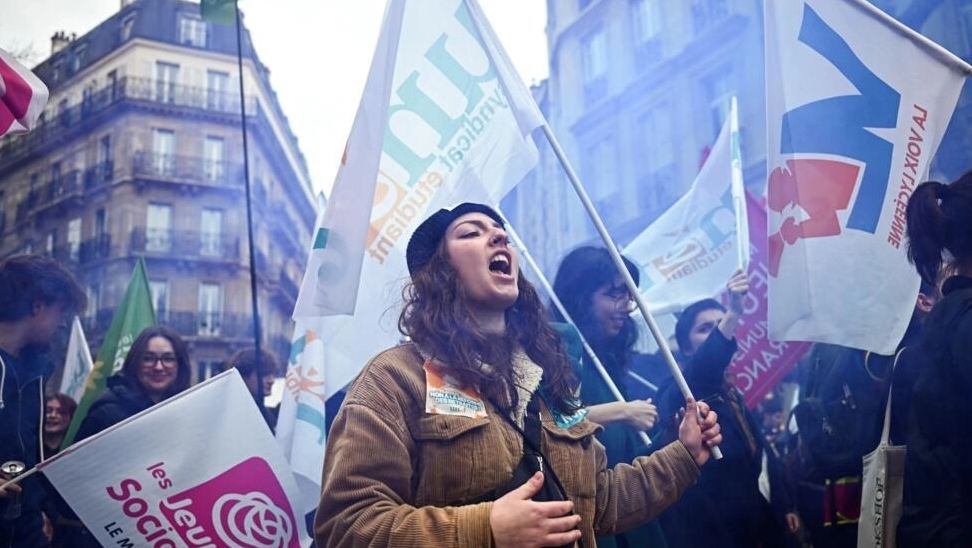Strikes against bitterly contested plans to reform pensions in France continue on Tuesday, and this time unions have upped the ante. Unlike previous walkouts, this week’s industrial action has no pre-arranged end date. With workers across multiple sectors expected to strike, life in France could grind to a halt for days on end.
Teachers, gas and electricity workers, train drivers, and industrial workers are all expected to join strikes that begin on Tuesday, sparking national upheaval that could last for days on end.
March 7 will mark the sixth day of industrial action since January over government plans to reform pension rights in France and increase the retirement age from 62 to 64.
But unlike previous strikes, major confederations of French trade unions – including the CFDT and CGT – have announced ‘’grèves reconductibles’’ meaning workers will vote at the end of each strike day on whether to continue industrial action. With no fixed end date, unions hope rolling walkouts have the potential to disrupt daily life and threaten the economy so severely that it forces the government into submission.
"We always said that we would go into a higher gear if necessary," the head of the influential CGT union, Philippe Martinez, told French weekly the Journal du Dimanche newspaper on Sunday. "It will be the case on Tuesday."
Representatives say striking workers are in for the long haul. For gas and electricity workers, walkouts which began on Friday March 3 will continue “at the minimum until the 7th, and at the maximum until we win”, said the secretary-general of union confederation CGT Energie, Sébastien Ménesplier.
On Friday energy production in France was reduced in multiple nuclear power stations bringing down overall electricity supply. In the midst of a cost of living and energy crisis, union representatives said production would fall even lower as strikes continue, in order to negatively impact the French economy.
For the week ahead, Ménesplier predicted targeted energy cuts, blockades, sit-ins, and ‘’Robin Hood’’ operations, adding: “If Emmanuel Macron doesn’t want France to come to a standstill and a dark week for the energy industry, it would be better for him to withdraw his reforms".
Walkouts to impact industry, transport, education
Participation on Tuesday is expected to be high, with workers across a range of sectors expected to mobilise.
In the transport sector, national rail company SNCF and Ile-de-France transport provider RATP are both expecting major ongoing strikes, with transport authorities warning of “major disruption” in Paris.
In December 2019 walkouts by transport staff over pension reform continued for weeks on end with public transport brought to a halt in parts of the capital and around France.
International journeys on Thalys trains and flights will also be impacted, with the French civil aviation authority (DGAC) recommending that airports in major cities across France reduce flight traffic by up to 30%. Delays and cancellations are expected.
In education, the seven major teaching unions have called for “total closure” of schools on March 7. High school and university students are expected to join protests alongside staff from Tuesday, with a peak of activity on March 9 with a dedicated “Youth Mobilisation” day.
And in the industrial sector, the CGT has called on oil refinery workers to “block the whole economy” with ongoing walkouts to disrupt the production, distribution and import of fuel.
Petrol and chemistry workers, including the pharmaceutical sector, have been asked to strike along with France’s 1.5 million metal workers – many of whom work in market-leading aeronautic, automobile and steel companies.
Refuse collectors, labourers, dock workers and more have also been called on to strike, “until the reforms are withdrawn”, the CGT says.
On Sunday, truck drivers began strikes early with blockades expected at certain industrial facilities and "go-slow" operations set to snarl traffic on major roads.
Brought to a standstill
As more workers join the industrial action, unions hope France will be brought “to a standstill” on Tuesday and beyond.
Up to 1.4 million people are expected to take part in protests, with 60-90,000 protesters in Paris alone, police have said. Unions also expect the scale of the upheaval to be evident in other ways; roads could be blocked, shops shuttered and building sites silent.
While the Secretary-General of the CGT representing chemistry workers said strikers were ready to “bring the French economy to its knees” to achieve their objectives, the government has tried to dissuade strikers.
Minister of Public Action and Accounts Gabriel Attal warned that disruption that threatened the economy risked bringing workers to their knees, rather than the economy, and called on unions to act “responsibly".
Asked about the strikes on Saturday as he completed a tour of African countries, Macron said he had "nothing new to say" on the topic.
Source: AFP



























